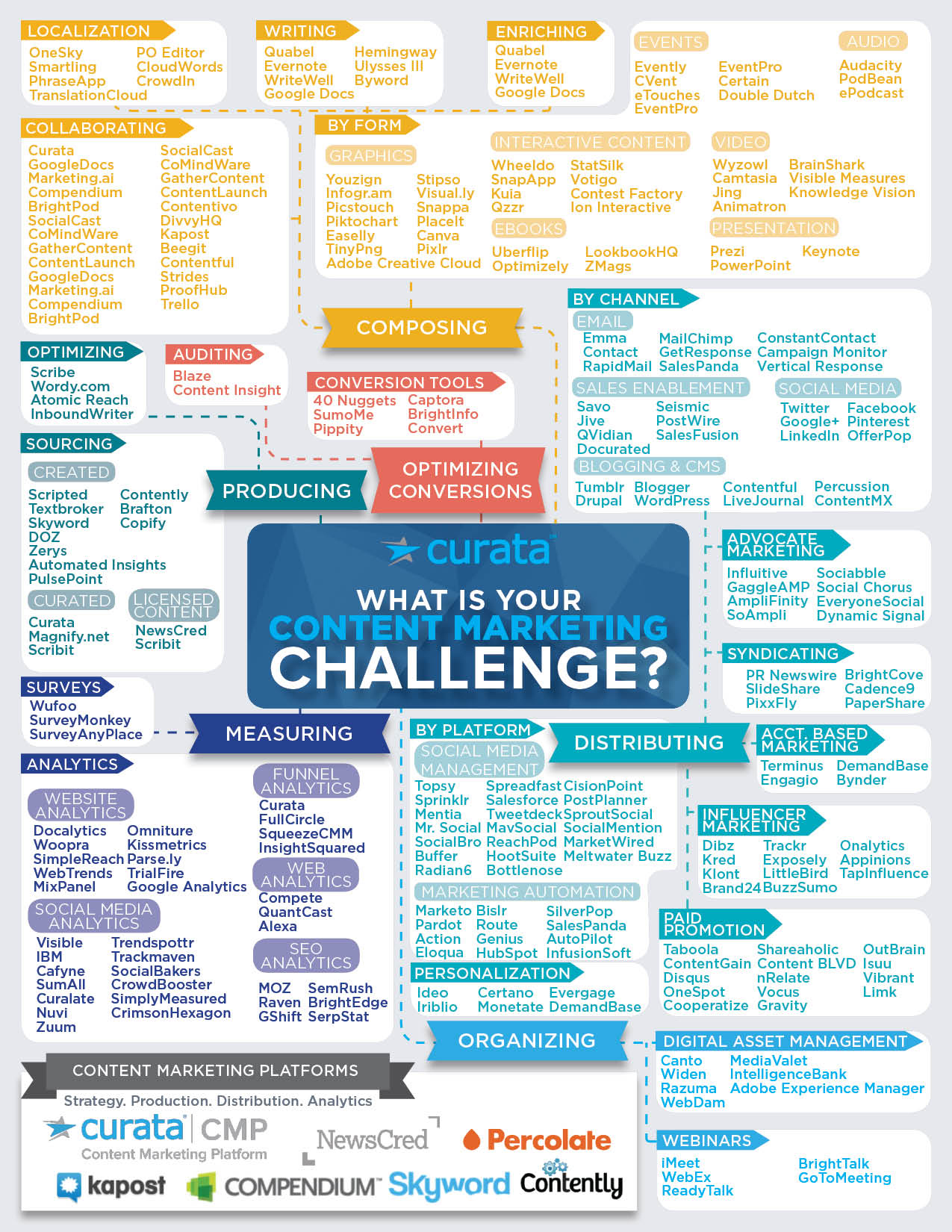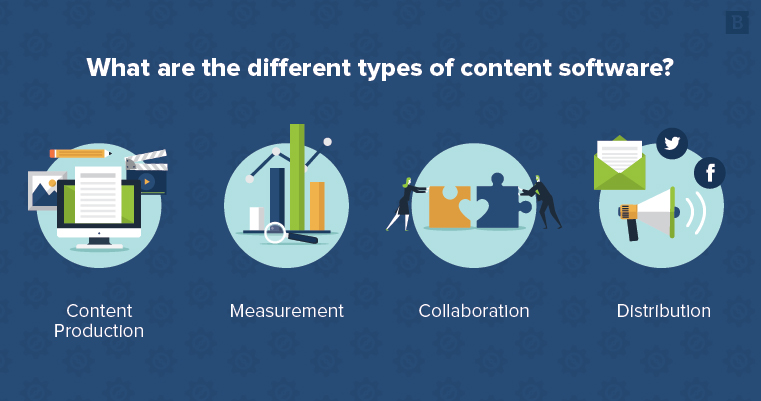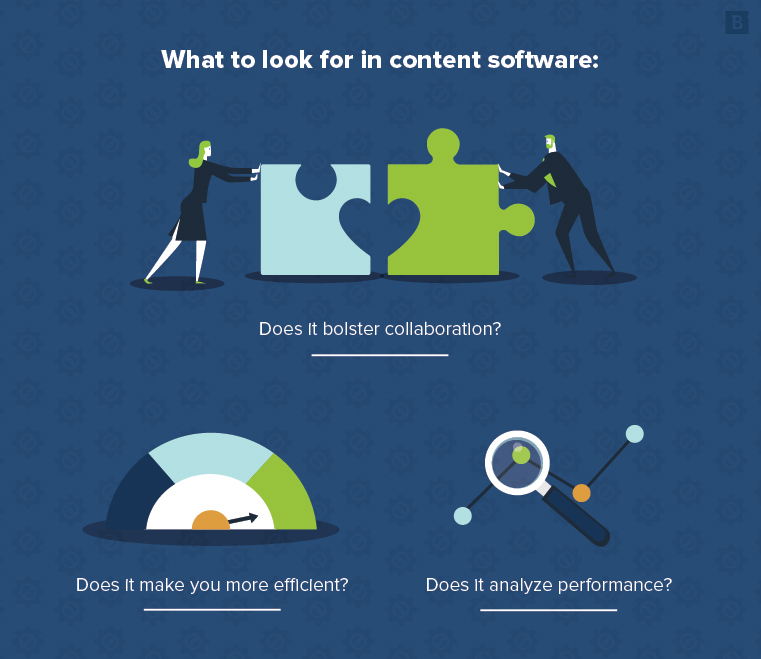Content marketing is fiercely competitive, and you’re always on the hunt for that edge to boost your site ranking, attract attention to your content and amplify your brand message.
You don’t need to go it alone, of course. Content marketing software can be your secret weapon, enhancing everything from content creation to copy optimization and distribution. These tools can help you execute your content strategy, maximize your marketing budget, and even delve into analytics like Google Analytics for deeper insights.
Whether it’s social media management, email marketing or SEO content, the right content tool can accelerate your marketing efforts from zero to sixty in a heartbeat — provided you choose the right platform.
Why You Need Content Software
You may be asking yourself, “Do I really need software to manage my content marketing plan?” Sure, you could go it solo — if you’re into self-inflicted stress, that is.
If you enjoy pain and all the headaches that come with juggling content creation, social media management, SEO, email marketing and analytics without any help, be my guest.
However, content marketing software is non-negotiable if you’d rather streamline your efforts and manage every facet of content marketing from one central hub.
Not completely convinced? Consider everything that goes into content marketing:
- Content creation (copywriting, graphic design, video production, etc.).
- Social media.
- SEO.
- Email campaigns.
- Distribution.
- Performance review and analytics.
- And much more.
That’s a lot of moving parts. Even the most absurdly detailed person would have trouble keeping tabs on everything without some form of content management.
Content marketing software condenses all of those pieces into a single — and user-friendly — platform. Need to know the status of a blog post? Check in on your social media strategy? See how your drip email marketing campaign’s doing? It’s all right there in one place.
Best of all, every stakeholder can pop in and get updates on your content marketing plans whenever necessary. Writers, designers, social teams, marketing teams, executives and third-party vendors all have eyes on each cog in your content marketing machine. You can stay on top of the bigger picture while also keeping track of the finer details.
That’s just the tip of the iceberg, though. There are all kinds of content marketing tools out there, each with different specialties and features. Knowing what you need help with is the first step to finding the right solution for your organization.
Subscribe to
The Content Marketer
Get weekly insights, advice and opinions about all things digital marketing.
Thank you for subscribing to The Content Marketer!
What Are The Different Types Of Content Software?
Now we’re getting to the good stuff. The world of content marketing software is vast — much more extensive than most probably realize. If there’s a content marketing pain point, then there’s an application specifically designed to solve it. Need help with content optimization? There’s software for that. Or how about giving your social media management a boost? Paid promotion, email marketing, webinars, analytics (of the website, social media and funnel variety) — there’s a tool for every occasion.
I mean, just take a look at this:

That’s a heck of a lot of categories. Too much to reasonably cover here. To be fair, not every item included here is an actual content marketing platform. However, what all these tools have in common, whether they fall under the category of content marketing platforms or not, is their collective contribution to streamlining content management and enhancing overall efficiency in various aspects of digital marketing.

Still, it’s a ton to unpack, so let’s break things down into a more manageable list of the major content software types:
1. Content Production
If you need help creating the fuel for your content marketing machine, several platforms can guide you. These content creation tools can help you optimize your content for SEO purposes, giving recommendations on keywords, content length, discussion points and more.
While these solutions offer valuable guidance, they won’t write blogs or design infographics for you. You’ll still need to take care of that the old-fashioned way: with a team of skilled content creators.
2. Content Management
Content management transcends the mere definition of a CMS (Content Management System). It encompasses the broader spectrum of activities such as organizing cross-functional teams, crafting meticulous content calendars, streamlining collaborative workflows and efficiently managing digital assets.
These functionalities harmonize to not only simplify the website management process but also to ensure the seamless execution of your content marketing initiatives, thus strengthening your online presence.
3. Measurement
Content won’t do much good if you can’t measure how each piece is performing, remove whatever elements aren’t working and reinforce strategies that are paying off. A host of content software platforms provide performance metrics and analytics for every aspect of content marketing.
Whether you’re keen to delve into SEO metrics or social media performance, there’s a content analytics tool that fits the bill. Some of our go-to’s at Brafton include Google Analytics and Semrush.
4. Collaboration
Content marketing is a team sport. You’ll likely have a mix of writers, content strategists, social media managers and videographers. Keeping everyone aligned is a Herculean task without a collaboration and project management platform. Trust us: Managing your content marketing plan with just spreadsheets is a recipe for chaos.
5. Distribution
Once your content’s ready to go, you’ve got to get it out into the world. The options to consider here are plentiful. You can promote new pieces on social media channels, share them with customers and potential leads in newsletters or boost them up with a shoutout from a strategically chosen influencer.
You need to prepare digital assets for every phase of the buyer’s journey and ensure the right content is available at the right time in the right place to resonate with your target audience.
Many content software platforms have overlapping features, dipping into multiple buckets. For instance, marketing automation software accelerates and streamlines email marketing efforts, allowing you to distribute newsletters and email blasts to a large audience while strategically segmenting email lists for better results. The odds of finding one that has absolutely everything you’ll need may be pretty slim, but you can mix and match applications to get just the right balance of capabilities to make your content marketing efforts shine and reach all of your distribution points.
6. Content Curation
Not everything used in your content strategy needs to be made in-house. Curating the latest industry news, trends and updates is a great way to engage your audience and share valuable insights. Fill email newsletters, news roundups and other digital assets with the best insights around and give them a reason to keep checking back in with your brand.
7. Content Automation
Manual tasks can be a drag on your content marketing efforts. Content automation tools come to the rescue by streamlining repetitive tasks like social media posts scheduling, email marketing and even content distribution. These platforms can integrate with your marketing software to create a seamless workflow, freeing you to focus on strategy and content creation.
8. Content Personalization
In today’s saturated digital landscape, generic content just won’t cut it. Content personalization tools enable you to tailor your content marketing materials to individual user behaviors and preferences.
Whether it’s email marketing campaigns or social media content, personalization tools use analytics and audience insights to deliver a more targeted and engaging experience.
9. Content Optimization
You’ve created stellar content, but how do you ensure it reaches its full potential? Content optimization tools help you fine-tune your content strategy. These platforms offer real-time SEO content suggestions, keyword research and even content analysis to improve your content’s visibility and engagement rates.
They often integrate with Google Analytics and Google Search Console to provide a comprehensive view of how your content is performing.
What To Look For in Content Software
Every situation is unique, especially when it comes to content marketing. However, you’ll want some universal features in your content marketing software. Remember these three core benefits to guide your selection: collaboration, efficiency and analytics. A top-notch platform will enhance all three, giving you the most value for your investment.

Does It Bolster Collaboration?
Collaboration is key in content marketing. Your marketing team will include writers, designers, content strategists and social media managers. All these stakeholders need insight into ongoing social media posts and email marketing campaigns.
Your content marketing platform should facilitate this collaboration. For instance, if you have an email marketing drip campaign in the works, your sales team should be in the loop. A unified content calendar on a single platform can make this a breeze.
Does It Make You More Efficient?
Operational bottlenecks can doom even the best-laid content strategies. Your content software should streamline your workflow, from content planning to content production and content optimization. Integrate it with other marketing tools you’re using, like Google Analytics or Zoho Social, to provide a comprehensive view of your content’s performance.
Does It Analyze Performance?
Analytics are the lifeblood of any content marketing strategy. Your content marketing tool can offer robust content analysis features that measure everything from site traffic to social media engagement.
Depending on your focus — be it organic traffic, social media marketing or lead generation — your software can help you track those KPIs.
By keeping these considerations in mind, you can select the best content software that aligns with your needs, whether you’re looking for content creation tools, social media management software or content optimization tools.
What’s The Best Content Software In 2023?
We’ve carved out a few important areas to look at when vetting content software, but what’s the best option for each category?
1. Content Production: MarketMuse
If you want to be sure that every single piece of content you produce is fully optimized for engagement and ranking, MarketMuse is where it’s at. This AI-based platform performs in-depth content analysis and highlights specific ways to improve your content’s performance. It gets very granular, recommending specific topics to cover, target keywords to include and word counts to aim for, ultimately generating a score based on your content’s expected performance.
MarketMuse is your content creators’ best friend, helping them write articles, blog posts, landing pages and other web content that ranks higher on search engines, drives more organic traffic and resonates better with your target audience.
2. Content Management: Brafton Content Marketing Platform
Brafton’s Content Marketing Platform is a comprehensive powerhouse designed to elevate your entire digital marketing strategy. Whether you’re a marketing SaaS software company, a retail brand or anything in between, Brafton offers a robust platform that allows you to categorize and organize all your marketing assets, from visual content to SEO content, email marketing campaigns and more.
Brafton is committed to maximizing the utility of every asset you create, be it visual, textual or interactive. It’s the epitome of what a digital marketing platform should be, offering unique features like:
- All-in-one marketing performance platform.
- Seamless categorization and organization of assets.
- Custom tagging for easy retrieval and reuse.
This platform is particularly well-suited for medium-to-large enterprises needing a comprehensive, all-encompassing solution for managing intricate digital marketing campaigns. If you’re looking for a platform that offers more than just basic content management — one that comes with a full suite of marketing tools, analytics and social media management capabilities — then Brafton’s Content Marketing Platform should be on your radar.
3. Collaboration: Airtable
This project management platform is guaranteed to keep your team on track and on the same page. Airtable uses a spreadsheet-style interface that should be familiar to any employee and is incredibly intuitive and easy to use. Users can upload files, create production and publication schedules and share it all with anyone in the organization.
Best of all, Airtable is a cloud-based platform, so you can access it anytime, anywhere.
4. Measurement: Google Analytics
Not the most creative selection, but there’s a reason for that: Google Analytics is the platform to use to measure site and content performance. Google Analytics excels as the go-to tool for measuring site and content performance, thanks to its widespread adoption, comprehensive metrics, customizable reporting, and seamless integration capabilities.
5. Honorable mention: Semrush
Semrush may not have the ubiquity of Google Analytics, but it holds its own when it comes to competitor analysis and keyword research. If you want to get started out on the right foot with your content creation, Semrush can point you in the right direction.
6. Distribution: HootSuite
HootSuite is one of the most popular marketing tools around. Tons of successful content marketers use this platform to manage their social media activity, scheduling brand posts on Twitter, Facebook, LinkedIn and more. HootSuite is one of the best distribution tools out there, letting marketers quickly and easily upload blogs, graphics, videos and social media posts to all of the leading platforms. Reaching more social media users and potential customers has never been easier.
7. Content Curation: Curata
Curating the latest and greatest industry trends and news can be time-consuming, but that’s where Curata comes into play. This platform provides all the tools you need to find great content that’s relevant to your audience and share it with them. The best part? Your in-house team can spend more time creating unique content that fuels your inbound marketing strategy.
Some outstanding features:
- Smart content discovery.
- Customizable feeds.
- Easy sharing and distribution.
- Analytics dashboard.
- Content calendar integration.
Curata is an ideal tool for marketing teams that want to stay ahead of the curve without spending hours on research and curation. It’s particularly useful for businesses that rely heavily on staying current with industry trends to fuel their content marketing platform.
8. Content Automation: HubSpot
When it comes to automating your content marketing efforts, HubSpot stands out as the go-to platform. Designed to simplify the complexities of marketing automation, HubSpot enables you to set up email sequences, automate social media posts and personalize website content based on user behavior.
HubSpot’s Marketing Automation platform is a powerhouse that integrates seamlessly with your existing tools, offering a centralized hub for all your automation needs. From lead nurturing with automated email campaigns to scoring leads based on engagement, HubSpot covers it all.
Unique features HubSpot brings to the table:
- Comprehensive marketing automation capabilities.
- User-friendly interface.
- Advanced analytics for tracking the effectiveness of automated campaigns.
Ideal for businesses of all sizes, HubSpot is particularly beneficial for those looking to streamline their marketing processes and focus on scaling their efforts.
9. Content Personalization: Coveo
When it comes to content personalization, Coveo is the cream of the crop. This platform is a game-changer, offering AI-powered solutions that take content personalization to a whole new level. Whether you’re in E-commerce, SaaS or any other industry, Coveo adapts to your specific needs, delivering personalized content experiences that resonate with your audience.
What makes Coveo truly stand out are its unique features:
- AI-driven personalization.
- Real-time analytics.
- Multi-platform integration.
Coveo is particularly beneficial for businesses that prioritize customer service and engagement. Its AI capabilities enhance content creation and optimization and play a significant role in marketing automation.
So, if you’re looking to offer a truly personalized user experience that boosts engagement, increases conversion rates and builds customer loyalty, then Coveo is the content personalization tool you’ve been searching for.
10. Content Optimization: Clearscope
If you’re aiming to fine-tune your content for both search engines and your audience, Clearscope is the tool you shouldn’t overlook. This platform specializes in making your content engaging and precisely what your audience is searching for. With Clearscope in your toolkit, you’re not merely casting content into the digital abyss but positioning it for maximum impact and reach.
Features that stand out:
- Keyword and topic analysis.
- Competitor content grading.
- Real-time optimization tips.
Best suited for content creators and SEO experts who want to boost their content’s organic search performance while also satisfying user needs.
Which Content Software Is Right For You?
So, with all of that being said, is there one end-all, be-all platform for your content marketing requirements? Probably not, but you can limit your tools to a select few that address your most pressing needs, eliminate roadblocks and streamline your digital marketing efforts.
Like everything else in content marketing, the best content marketing software solutions constantly evolve to keep up with industry best practices and provide the most impactful features possible.
Today’s leaders could quickly become tomorrow’s afterthoughts, so keep an eye out for software updates and new platforms that might give you more bang for your buck.
In the meantime, you can’t go wrong with any of the content software platforms we’ve highlighted here.
Editor’s Note: Updated September 2023.





